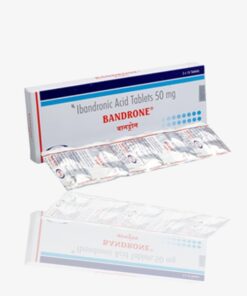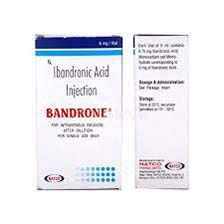Buy Zoldria : Zoledronic Acid Injection IP 4 mg Online
$50.18
Brand Name : Zoldria
Composition : Zoledronic Acid
Manufactured by : Cipla Ltd.
Strength : 4 mg
Form : Injection
Packing : Pack of 1 vial
Prescription Required *
Zoldria, also known as Zoledronic Acid Injection IP 4 mg, is a prescription medication used to treat high levels of calcium in the blood caused by cancer (hypercalcemia of malignancy). It is also used to treat bone metastases or tumors caused by certain types of cancer, such as breast cancer and prostate cancer.
HOW TO USE:
Zoldria is given as an infusion, which is a slow injection into a vein in your arm. The infusion typically takes about 15 minutes to complete. The dosage and frequency of treatment will vary depending on the individual and the condition being treated. It is important to follow your doctor’s instructions and schedule all of your appointments for the full course of treatment.
Storage Conditions:
Zoldria should be stored at room temperature between 20°C and 25°C (68°F to 77°F). Keep it in its original package and out of reach of children.
Mechanism of action:
Zoldria belongs to a group of medications called bisphosphonates. It works by slowing down the breakdown of bone tissue, which can reduce the amount of calcium released from the bones into the bloodstream. This helps to reduce the risk of bone fractures and other complications associated with bone metastases or tumors.
Precautions:
Before using Zoldria, inform your doctor if you have a history of kidney disease or if you are pregnant or breastfeeding. It is also important to inform your doctor if you are taking any other medications, including prescription and over-the-counter drugs, as there may be potential drug interactions.
Contraindications:
Zoldria should not be used if you are allergic to zoledronic acid or any other ingredients in the medication. It is also contraindicated for patients with severe kidney disease or hypocalcemia (low calcium levels in the blood).
Drug Interactions:
Zoldria may interact with other medications that affect the kidneys, such as diuretics and nonsteroidal anti-inflammatory drugs (NSAIDs). It is important to inform your doctor if you are taking any other medications, including prescription and over-the-counter drugs, to avoid potential interactions.
Overdose:
An overdose of Zoldria can be potentially life-threatening. Symptoms of an overdose may include low blood calcium levels, kidney failure, and changes in heart rhythm. If you suspect an overdose, seek emergency medical attention immediately.
Side effects:
Like all medications, Zoldria may cause side effects, though not everyone experiences them. Common side effects of Zoldria may include fever, flu-like symptoms, bone pain, and nausea. Rare but serious side effects may include kidney failure, bone loss in the jaw (osteonecrosis), and an increased risk of fractures in the thigh bone.
In conclusion, Zoldria is a bisphosphonate medication that is used to treat high levels of calcium in the blood caused by cancer (hypercalcemia of malignancy). It is also used to treat bone metastases or tumors caused by certain types of cancer. It works by slowing down the breakdown of bone tissue, which can reduce the amount of calcium released from the bones into the bloodstream. It is important to follow your doctor’s instructions and schedule all of your appointments for the full course of treatment. As with all medications, there may be potential side effects and precautions to consider.
Be the first to review “Buy Zoldria : Zoledronic Acid Injection IP 4 mg Online” Cancel reply
Related products
Osteoporosis Arthritis
Buy Prolia (denosumab) Injection 1 pre-filled syringe 60mg/ml Online For Sale
Osteoporosis Arthritis
Osteoporosis Arthritis
Osteoporosis Arthritis
Osteoporosis Arthritis
Osteoporosis Arthritis
Osteoporosis Arthritis
Osteoporosis Arthritis













Reviews
There are no reviews yet.